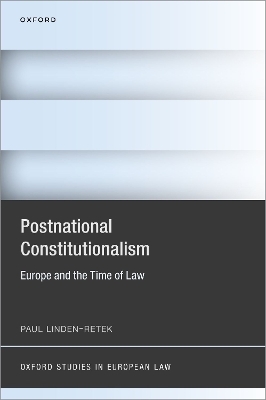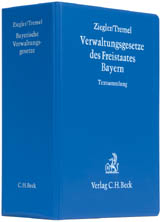
Postnational Constitutionalism
Europe and the Time of Law
Seiten
2023
Oxford University Press (Verlag)
978-0-19-289918-7 (ISBN)
Oxford University Press (Verlag)
978-0-19-289918-7 (ISBN)
Develops a critical theory of postnational constitutionalism at a time when the project of integrating Europe's peoples through the rule of law is faltering. Spanning many bodies of EU jurisprudence, Linden-Retek devotes specific attention to migration and asylum--struggles where questions of solidarity and belonging are most acute.
At a time when the integration of the European Union's peoples through the rule of law is faltering, this book develops a critical theory of postnational constitutionalism. Today, widely held conceptions of EU law continue to mislead citizens about the nature of political identity, sovereignty, and agency. They lose sight of a critical idea on which post-nationalism depends-that constitutional self-authorship is narrative, and the polity is a subject whose identity, history, and legacy are still in formation. Absent this vision, EU law reproduces crises of legitimacy: the depoliticization of public life; emergency rule by executive decree; a collapse of solidarity; and the rise of nativist movements. The book diagnoses this impasse as the product of a problem familiar to modernity: reification--a process in which social and historical relationships are misattributed as timeless relations among things.
Reification's shrinking of social dilemmas, moral principles, and political action to narrow perceptions of the present explains law's role in perpetuating crisis. But this diagnosis also points to a remedy. It suggests that to sustain the emancipatory potential of EU constitutionalism we must recover law's relationship to time. Postnational Constitutionalism: Europe and the Time of Law proposes a temporally-attuned constitutional theory with principles of anti-reification, narrative interpretation, and non-sovereign agency at its centre. These principles reimagine essential domains of constitutional order: social integration, constitutional adjudication, and constituent power. Spanning various bodies of EU jurisprudence, the book devotes particular attention to migration and asylum--struggles where questions of solidarity, law, and belonging are most generative and acute.
At a time when the integration of the European Union's peoples through the rule of law is faltering, this book develops a critical theory of postnational constitutionalism. Today, widely held conceptions of EU law continue to mislead citizens about the nature of political identity, sovereignty, and agency. They lose sight of a critical idea on which post-nationalism depends-that constitutional self-authorship is narrative, and the polity is a subject whose identity, history, and legacy are still in formation. Absent this vision, EU law reproduces crises of legitimacy: the depoliticization of public life; emergency rule by executive decree; a collapse of solidarity; and the rise of nativist movements. The book diagnoses this impasse as the product of a problem familiar to modernity: reification--a process in which social and historical relationships are misattributed as timeless relations among things.
Reification's shrinking of social dilemmas, moral principles, and political action to narrow perceptions of the present explains law's role in perpetuating crisis. But this diagnosis also points to a remedy. It suggests that to sustain the emancipatory potential of EU constitutionalism we must recover law's relationship to time. Postnational Constitutionalism: Europe and the Time of Law proposes a temporally-attuned constitutional theory with principles of anti-reification, narrative interpretation, and non-sovereign agency at its centre. These principles reimagine essential domains of constitutional order: social integration, constitutional adjudication, and constituent power. Spanning various bodies of EU jurisprudence, the book devotes particular attention to migration and asylum--struggles where questions of solidarity, law, and belonging are most generative and acute.
Paul Linden-Retek is Associate Professor of Law at the University at Buffalo School of Law, The State University of New York. He writes and teaches in the areas of comparative constitutional law, critical legal theory, and international law, with an emphasis on European Union law, international human rights law, constitutional theory, and refugee and asylum law. Linden-Retek has previously taught at Yale University and held fellowships at the Schell Center for International Human Rights, Yale Law School, and the Jean Monnet Center for International and Regional Economic Law & Justice, New York University School of Law.
| Erscheinungsdatum | 14.04.2023 |
|---|---|
| Reihe/Serie | Oxford Studies in European Law |
| Verlagsort | Oxford |
| Sprache | englisch |
| Maße | 163 x 240 mm |
| Gewicht | 754 g |
| Themenwelt | Recht / Steuern ► EU / Internationales Recht |
| Recht / Steuern ► Öffentliches Recht ► Besonderes Verwaltungsrecht | |
| Recht / Steuern ► Öffentliches Recht ► Verfassungsrecht | |
| Sozialwissenschaften ► Politik / Verwaltung | |
| Sozialwissenschaften ► Soziologie | |
| ISBN-10 | 0-19-289918-X / 019289918X |
| ISBN-13 | 978-0-19-289918-7 / 9780192899187 |
| Zustand | Neuware |
| Informationen gemäß Produktsicherheitsverordnung (GPSR) | |
| Haben Sie eine Frage zum Produkt? |
Mehr entdecken
aus dem Bereich
aus dem Bereich
AufenthaltsG, FreizügigkeitsG/EU, AsylG
Buch | Softcover (2024)
dtv Verlagsgesellschaft
17,90 €
Grundwerk ohne Fortsetzung. Rechtsstand: 1. November 2024. …
Buch | Hardcover (2024)
C. H. Beck (Verlag)
79,00 €


